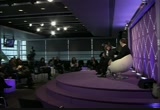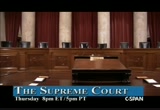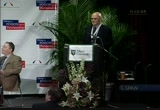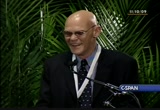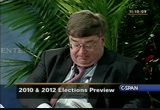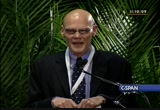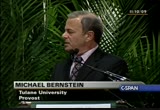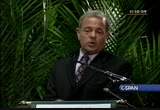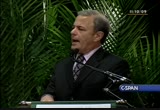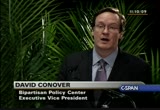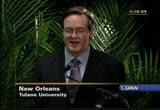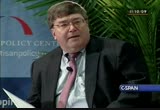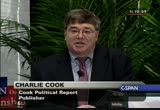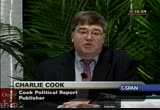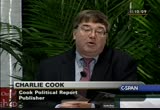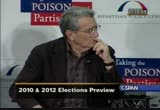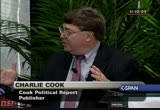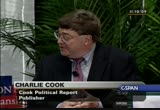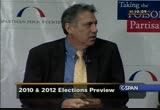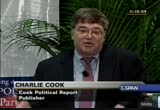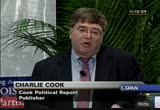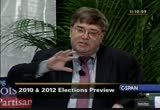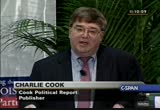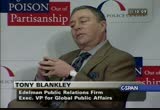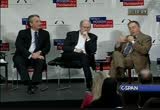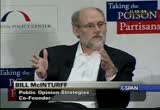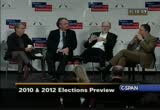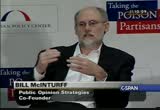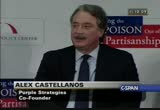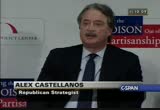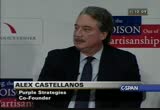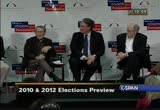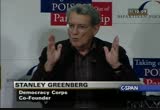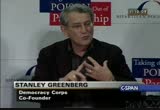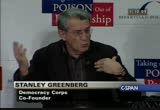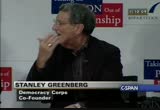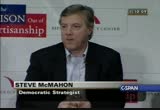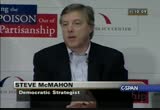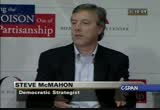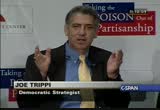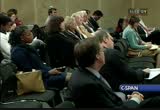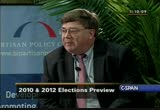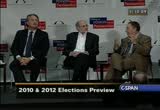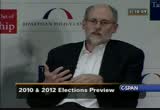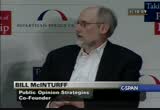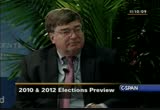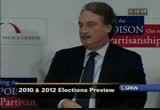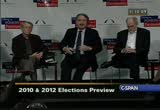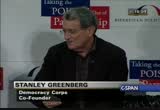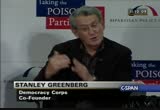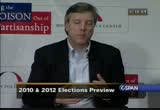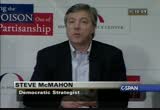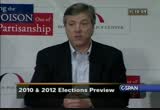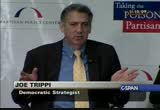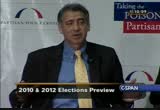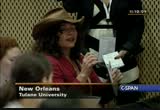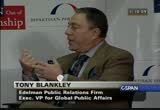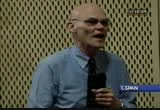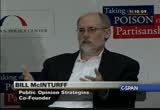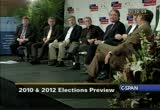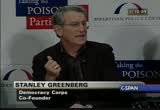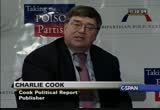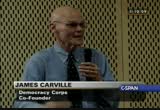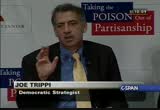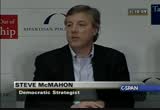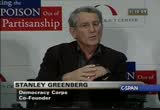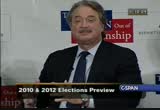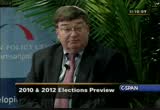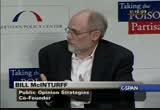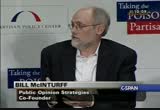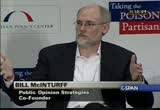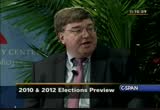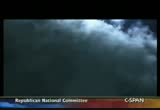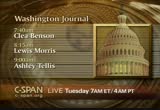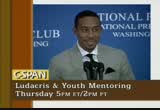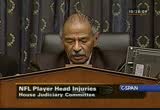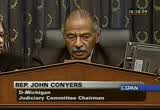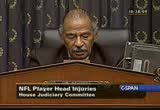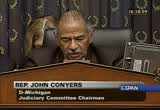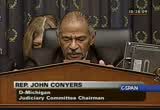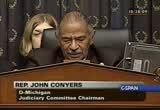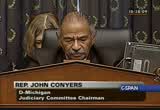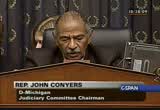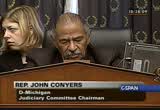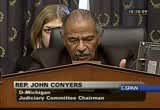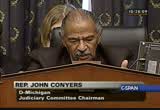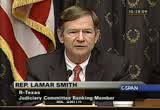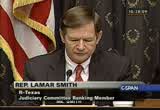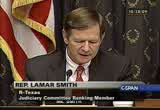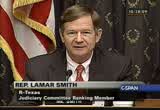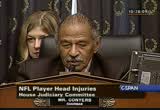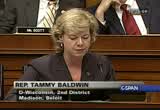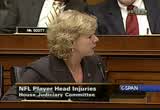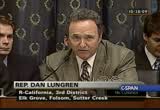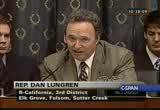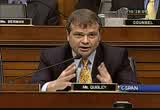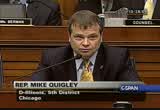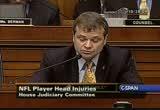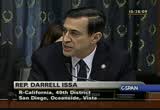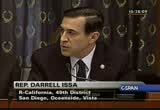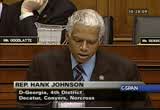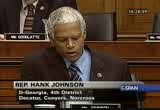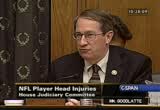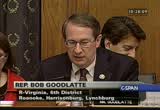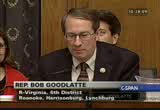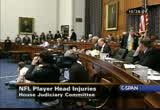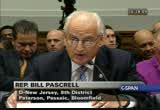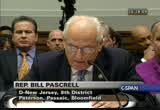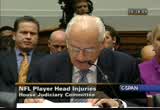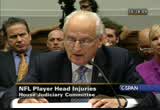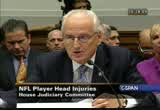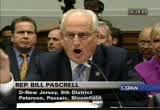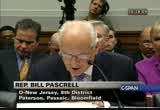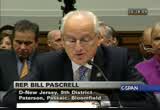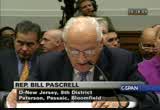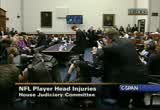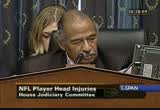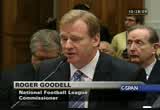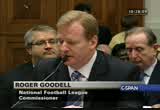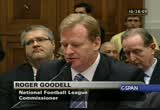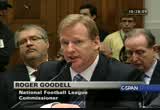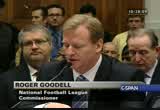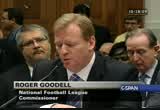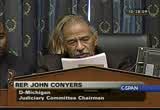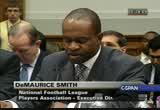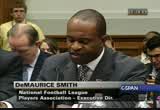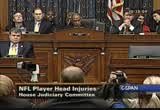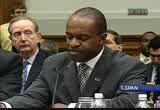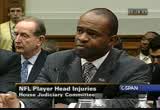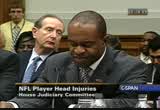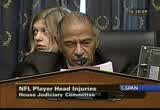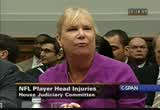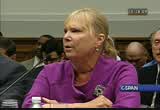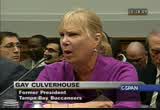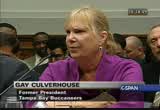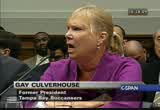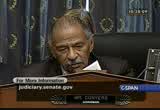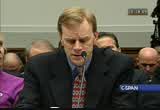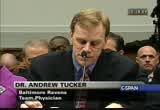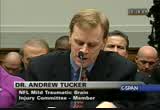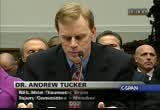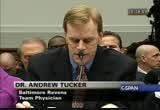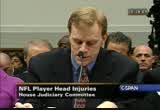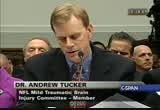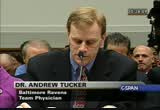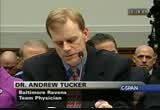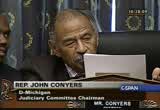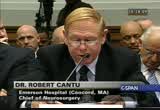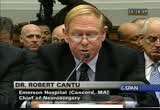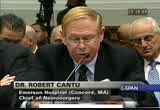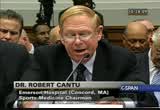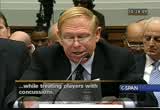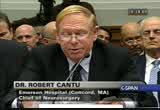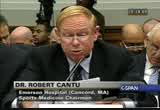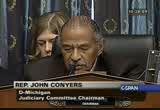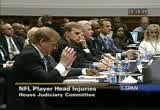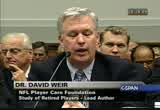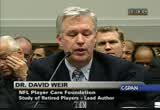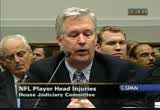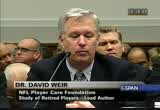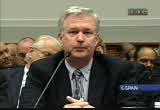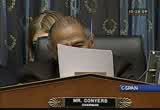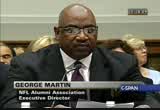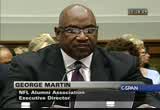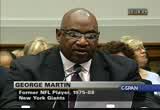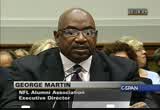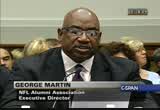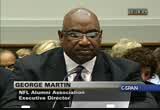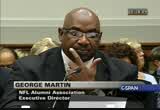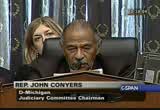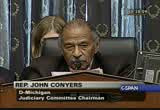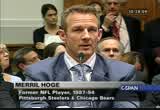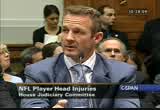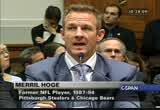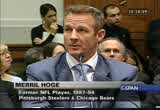tv Tonight From Washington CSPAN November 23, 2009 8:00pm-11:00pm EST
8:01 pm
supreme court, home to america's highest court, reveals the building in detail. friday at 8:00 p.m. eastern, the white house, inside america's most famous home. beyond the bill their robes, our visit shows the public places as well as those rarely seen spaces. saturday, the capital. the history, art, and architecture of one of america's most symbolic structures. three memorable nights, out thursday, friday, and saturday at 8:00 p.m. on c-span. this set is $24.95. order online. >> a look at next year's congressional election and the 2012 presidential campaign. we will hear from republican and democratic strategists. this is about an hour and 10 minutes.
8:02 pm
>> i -- i like to give everyone an insight into what is going on here. i give credit to julia reed who deck of this quote for book she wrote which is an excellent book. she is quoting from 1877. "the city has been buried under taxes and fraud and mal administration. when i write about it as i intend to do soon, no one will believe i am telling the truth. it is better to live here in
8:03 pm
sackcloth and ashes than to own the entire state of ohio." [laughter] my apologies to ohio. he sums up the way -- we are not going anywhere. i will turn it over to the panel but i have to say a few words about charlie. charlie is a native of shreveport, louisiana. one of the real treasures that louisiana has. it sounds redundant to the people from washington. people here or who may be listening on c-span, he is the authority in the world on elections and congressional elections. he has been doing it longer than anyone. he is not only respected in the political community, his integrity is unquestioned and he
8:04 pm
is one of the best people that we have in our community. we're proud that charlie is a proud son of our state. we relish in his successes. i hope his prediction that we get wiped out in 2010 proves wrong. he has a history of being right over a long time. i will turn this over to my dear friend, charlie, and ask him to introduce what is going to be difficult because we have a distinguished panel here. are you coming up? i am going to introduce -- this is always a good thing. 4 get your boss. -- forget your boss. the provost, who is a really big deal, is going to come up
8:05 pm
and say a few words. i apologize and please do not cut my pay. >> thank you and good morning. let me welcome all of you to this second day of discussion and sessions on bipartisanship. it has been a pleasure working with the bipartisan policy center. why and facilitating your visit with us here. we have been looking forward to having you and we're excited you were here. let me take a moment to see a few words about students. we do not see a lot of students in the room this morning. before noon, students are not around very much.
8:06 pm
they come out as the sun gets higher in the sky. we will see more of them later. i want to say a word about our students. they speak -- their actions speak directly to the themes of this gathering. we used to hear a lot when we look at college generations a few years ago. we heard about the me generation. there were a lot of analysis and critique of the selfishness of young adults in american society. what we're witnessing here and universities and colleges, it is the lead generation. these are a remarkable group of young people who are committed and interested in public service, community engagement, and social progress. i do not care what ever labels you use for a period is about being present and engaged with others for social betterment. some of you know, the president of the universe they spoke with
8:07 pm
you yesterday. tulane has been a key part of the recovery but it is students who left in the muscle of the recovery. they are engaged with the community. they support a variety of activities. we are proud of them. we also think that their actions speak to the principles and ideas that this gathering is about. one final comments. just to press the point home about our students. last year, we had 40,000 undergraduate applications here at tulane. out of that 40,000, we put out 90009500 offers of admission. from those offers, we generated a first-year class of 1500 students. we have never had anything close to 40,000.
8:08 pm
before katrina. before was 15,000 applications. this says something about this generation. i like to think they are drawn to us because -- to to clean because of me. it is what we're doing here there interested in being part of this recovery and community. we are proud of them. i think they in their pursuit of wheatwe, they uphold the principles you are exploring. welcome and enjoy the conference. [applause] >> it is my job to introduce charlie cook. the bipartisan center was
8:09 pm
founded by four leaders on the theory that people of good will can work through issues and , with solutions to pressing challenges. they did it as leaders of the senate. they're helping us do it now at the bipartisan policy center where we run projects on energy, climate, health care, transportation, national and homeland security c'mon the principle that we bring people from a diverse array of viewpoints together and provide them with the best research and analysis, a forum to discuss the pros and cons of issues and achieve principled bipartisan compromise, that we can help congress and the administration do their job better. in order to get those partisans to sit down, we need to let them. that is what this panel is about.
8:10 pm
i was talking to charlie cook last night. like a lot of folks my age, i owe my career to them. as a young manager in the late 1980's and early 1990's, there were not a lot of resources to help us make decisions about races around the country. the political report was the best decision making tool we had available. waiting for that booklet with the three hole punched in it every couple weeks was frankly and pathetically the highlight of my career. if charlie was a book, he would have some blurbs on his back from people like "the new york times." bob schieffer from cbs news, the bible of a political community. "the washington post", perhaps the best record of political races.
8:11 pm
we have been looking forward to this throughout the two days of this conference. put your hands together for charlie cook and his panel. >> i am going to go over here in the format -- the format lens itself to being over there. the reason is i can do a better job standing then seated. my wife says standing maximizes the difference -- distance between my head and my ass. thanks for the kind words the center is doing such important work, from the history of mankind for as long as there has been politics, people have felt like things used to be better in the old days and it has been like that. i can say that having come to
8:12 pm
washington in 1972, having started working in 1973 as an elevator operator in the senate office buildings and interning in 1973 and -- through 1975 and as a staffer in 1977, things have changed. it is not what the american people deserve. i hope the center -- the center will be doing some great things and hopefully, we can nudge it back to where it ought to be. as opposed to where it has been. this conference, i am very excited about the conference. this panel is awesome. i wish i had a hand in it but i did not. it looks a lot like what i would have done. what i will do it is run through a brief about the folks and i will sit down and start throwing some open-ended questions out. we can bring in the audience. in the world of press and
8:13 pm
communications, what is better than being a press secretary to the speaker of the house and a speech writer? what speaks to me more than anything else, as a little kid in the 1960's, my favorite tv show was "sky king". he appeared as a child actor. he was in an episode of "sky king". working for president reagan and newt gingrich, that is good. but "sky king" is not in his bio. alex costellano worked with charlie black in the way back days, he is known as the father
8:14 pm
of the attack gadd. some of you may think is disparaging. i had one consultant tell me that i sleep better at night knowing that my clients are going negative. a central part but one of the most talented guys around. a central figure in the campaigns of romney and mccain. he coined the phrase "soccer mom." "nascar dad" -- you had "soccer mom." stan greenberg is not happy with me because i spent three years beating republicans in 2006 through 2008. he is being nice. he is one of the finest
8:15 pm
pollsters in america today. one of the finest pollsters in the democratic party. and his democracy corps puts out some of the most terrific survey research. for us in the outside to see the very finest quality survey research and for tax reasons, you have to put it out there pretty much. you are looking over the shoulder of some of the best political lines in the business. if imitation is the sincerest form of flattery there is -- a republican think tank. you have to go around the world and talk to the world leaders that stan has pulled four. he headed up the team that elected bill clinton to the presidency. if you were going to describe on
8:16 pm
the republican polling side sort of nordstrom's and bloomingdale's put together. so they are huge but enormously high quality and also, some of the -- when i call any of the partners there, i am getting the straight scoop. they see so much data that they are going to see something before almost anybody else because they are pulling some of places. just fabulous work. and newly married. congratulations. >>i forgot this was on c-span. steve mcmahon.
8:17 pm
we go back. he was a central figure in the dipane campaign and the kennedy- gephardt and a political analyst. he is part -- teamed up with alex for purple strategy. working on nonpartisan efforts. steve is an enormously talented guy and worked campaigns in venezuela and nicaragua. all over the place. if you have been around washington, you have known joe for years. he was the central figure leading that phenomenon.
8:18 pm
just an enormously talented guy. the author of "the revolution will not be televised." joe is an enormously talented guy. we have a terrific panel. what i thought i would do is throw it out to and one by one and in a nutshell, our topic is supposed to be looking forward to 2010 and 2012. i do not want to interfere in this too much so i will jump in at the tail end. let me -- but go in reverse order. starting with joe. let me spend one minute. let me frame it and we will start with tony. you look at the midterm
8:19 pm
election, you look at history. the party in the white house almost always gets hammered. usually awash in the senate, an average of a six seat loss in the governorship. that is normal. and then you say, what about the circumstances? the greater exposure you have, the more seats and more risk you are. you cannot lose something you already got. democrats having picked up 54 seats in the elections, they go into this exposed. overexposed, i should say. with 40 democrats sitting in seats that were carried by john mccain. there are some -- is some exposure. you look at the circumstances and party identification. democrats came off a high of the 2008 election with a 17. advantage in party identification. it is more if you use the gallup figures, it has come down a good
8:20 pm
bit. five points for september. higher in october. the party identification badedge -- democrats had double-digit leads in 2006 through to that an aide and now it is down. most of the polls do not do registered voters so it overstates democrats. things have gotten tough. the final thing is the economy. we just saw unemployment went over 10%. this is the first time unemployment has been at that point since 1983. only once in the postwar era has unemployment been at double- digit into a midterm election, that was in -- the numbers came out in october of 1982.
8:21 pm
it looks like and whether you look at the optimistic or pessimistic projections, it looks like we will see unemployment of over 10% for 12 consecutive months. this is an enormously challenging and democrats are taking on tough and divisive issues. do the problems republicans have in terms of their damage to their brand over the last eight years, does that damage put a cap or a ceiling on how much they can capitalize on all these problems democrats have? there are some brand problems and there are some demographic problems. there are challenges the republican party is facing. we. two forces at work. democrats having a tough election. at the same time, very clear differences from where was when tony and it gingrich and republicans were trying to take over and successfully taking
8:22 pm
over congress in 1994 were the republican brand was not damaged. they had a clear leader and a positive message. they did not have the demographic issues that republicans have today. it is two big forces, which one is more dominant? let's go down the line. everyone say what you see happening or how you see it. what do you think is important? we will bring everybody in. thank you. [applause] >> for every action there is an equal and opposite reaction. the agenda of the president and
8:23 pm
his party have pushed into the american public -- a pretty radical or bold and we're seeing the reaction to that. i do not know how it plays out. how it breaks into tributaries but we have convulse of forces, great volatility of mood. hope alliance some elements still on the other side. there is room for dramatic election in 2010 and 2012. i have always thought that the best chance of any opposition party is the worst the governing party does. you may tactically be able to get further than you otherwise
8:24 pm
would. i think comparing this to 1994 when republicans took over the house and senate, the times were less convulsive but the republican party was better positioned. we were a better fighting machine. we had a clear leader and a doctrine we were working off of. we were coordinated. we knew what we stood for. that does not exist. the republican party is a mess but the forces are strongly and potentially with us. >> i am a structuralist so i look at a structure of an election cycle and the structure is clear. i have looked at the michigan consumer sentiment index. it has been done every month since 1952. there has been three times in american history where we drop below 65 on their scale. this is the fourth time.
8:25 pm
i went back and said if there were three other times, how long did it take for consumer confidence to recover to get to the mid-1980s? the answer was two to four yeas. we are -- fou-- fiourour years. this is a difficult cycle in terms of what it means for democrats. this is the point about gravity. the wrong track went up again, over 50% in the poll i do with peter hart. here is an intractable law. wrong track voters do two-thirds of sevesevef the 5%. this is the second structural
8:26 pm
problem. the third is -- what i say is [unintelligible] what i mean is the democrats have spent a fortune trying to get to surge voters to the polls. the electorate shifted. it has consequence for democrats. the intensity on the republican side is through the roof. as you look at the consumer confidence and the link the recovery and the wrong track going up, you look for midterms that are balancing the party, all those things point to a very
8:27 pm
difficult cycle for democrats in 2010. there is much about the republican party that is broken and needs to be fixed. none of these forces are fixing the party for the 2012 election. 1982 was awful and led to read again's -- to reagan's victory. the president still has a lot of structural advantages. >> i agree. how many were here yesterday for the last panel? we should say something new. never spit straight up. and the obama administration, a campaign that worked hard not to be its predecessor and we know
8:28 pm
bush administration was characterized. do not listen. swaggering, a big belt buckle and talking about issues and the american people did not think were central to their lives. one of the ironies of fate is now, a lot of americans look at the obama administration and see what are they doing? the economy is burning down and they are talking about issues that seem important but tangential. whether it is creating a big government health care plan or carbon tax, why are they talking about me? are they listening? they are spending irresponsibly. money that will come back to me. i am going to have to pay for it. never spit straight up. the midterm elections coming up are going to be -- people are going to be empowered not by
8:29 pm
rubber-stamp in what is going on. a voter can safe stop and think. a more thoughtful approach. republicans, if we do not fix some of our brand problems will probably pick up under 30 seats in the house. if we fix our brand problems, some of us think there is hope. it could be over 40. one thing we did not talk about yesterday. why did the young voters not show up for last tuesday's election? one of them is barack obama was not on the ballot. it will come out for him but not for democrats without him. i am not sure that is the case. elections are not about
8:30 pm
candidates. they're about voters. one of the things obama did was in power a new generation of voters by telling them, you are the change we have been waiting for. this is in your hands. you can change things. change is from the bottom up. this is a campaign where people can participate. he got elected and that narrative has turned on his head. the economy is screwed. there is nothing you can do. thank heavens we are here. we're going to solve your problems. it is not young people and voters as hero. unless that narrative is reversed, the democrats in 2010 or 2012 will not see that big flood. they will see it in 2010. >> let me respond not as a
8:31 pm
partisan. and agree with most of what has been said even in the setup to the discussion. democrats are going to lose seats. it is impossible to not lose seats in this kind of election. we agree that there are big things going on in respect to the two parties. whatever happens in 2010 is not a prediction of 2012. it could be the opposite. i think i agree with almost all of what has been said. i would accept the point on engagement in the election. when you look at the polls, who
8:32 pm
is engaged and who is interested has an incredible impact on who takes an interview. who will go through a 25 minute survey. when you look at the change after conventions, there are more people supporting one of the candidates. it is not because one in 10 have switched their minds. democrats are more interested after their convention and republicans are more interested after their convention. eventually, it settles out. it correlates with what happens in elections. engagement matters. the intensity of opposition -- the unity of conservative republicans against barack obama, the fact that two-thirds or three-quarters of republicans are conservative, they fear that obama is a threat to the republic produces an intensity
8:33 pm
and high turnout. they will produce high turnout of republican conservatives for the 2010 elections. it is reflected in the polls. the issue will be will democrats be engaged when they get to the end of this election. there is a lot that happens. as congress passed legislation? is the congress perceive to be making progress on issues that they were elected on? is there progress on the economy? is it moving in the right direction? >you look at some of the past of years. if you look at 1998, when we had the battle over impeachment. it was a surprise election. democrats were expected to lose. for sure they were going to lose. conservatives were upset with president clinton's behavior. it was a reaction against the
8:34 pm
overreach of the impeachment. democrats became mobilized at the end. democrats barely lost any seats. when we look at the intensity of the conservative republicans, the nature of that divisive politics, do we get a reaction at the end where democrats defend the change they brought? i do not think we know. polls show 20 seats right now. i will leave the discussion to where we think it goes. when we polled in the battleground district's leading into 2006 and 2008, each time we showed in our polls we have 26 seats and they picked it up in two stages. it was a great surprise to us. picking up 30 seats.
8:35 pm
it looks like you can get half back. i do not see anything that says you can do this in one shot. >> i do not know of anyone said be careful what you wish for. i will star there. democrats for a long time have wished for large majorities and the way you get there is by creating a big tent. that is big enough to accommodate different democrats. one of the challenges they face now and the estimates of where the seat count is, if the election were held to their -- today are about right. it is consistent. the big dilemma in my opinion is, do you look at the elections from last tuesday where independents -- in the elections in new jersey and
8:36 pm
virginia, they went for republicans. as a consultant, that is the canary in the coal mine. you are looking at that and say, we won independents and it generated a big majority. we have a canary in the coal mine situation if you look at these exit returns. another canary is the base. there were great hopes and great aspirations placed in president obama by people who were voting for somebody who represented an ideal. more than they were voting for a set of policy prescriptions. in the progressive community especially, the expectations were so high and in many respects, they remained high through this health care reform debate. you have problems with the base that you saw tuesday. young people and african- americans not showing up. you have on the health care reform bill that was passed,
8:37 pm
there is a revolt among progressives because of the stupak amendment on abortion. >> there is a sense of displeasure in the progressive community because they think they are being [unintelligible] on the public option. i came to washington 25 years ago to work for ted kennedy. he talked about health care all the time. he mostly talked about expanding insurance and providing health care to every american. he did not talk about the public option but that is the focal point of debate. republicans have let democrats fight among themselves.
8:38 pm
and the republicans are watching and progressives are staying home. independents are moving the other way. if those things do not change, it could be a very long evening for democrats in two years. i happen to think the obama administration is filled with political operatives who are aware of this. they're planning for it. what you will see is after health care reform, it will focus on getting those independents in the fold. the interesting thing will be whether the progressive community which has been disappointed continues to be disappointed and there is no one who knows that community better than joe. or if they recognize that progress is better than no progress. democrats and a democratic majority is better than the republican majority. but they may not.
8:39 pm
i do not know if you want to address that. >> these next two elections are likely to be the most disruptive for both parties that i've seen since i have been doingslookingt matter this time. everyone says that -- this will not be how history has shown it in the past. for a lot of different reasons, the panel has talked about -- you are going to see the intensity on the democratic side and it will show in primaries. the party committees will not have the control that they have had historically. you are -- it is not a special
8:40 pm
case where there is a primary opponent to an incumbent. the progressive community is looking for candidates to run against people who voted against health care. you are seeing on the progressive side, you will see primaries against incumbents who they believe voted the wrong way. you will see them fight in the primary and shop and work it. the same thing is happening on the republican side. we saw that in new york 23. some of the ways that played out with hoffman running as a conservative and losing, in some instance because of that fight.
8:41 pm
had there been a unified canada did on the right. iowens would not be a member of congress. you will have these massive fights in primaries on both sides. the question is, what emerges? do the republicans -- the bases can to win primaries. if they are contested. what comes out of this is the more progressive liberal candidates on the democratic side win out on these primaries. that coalition is energized because they have gotten out the bad would and the same thing happens on the republican side. we will have general elections that are sitting there and people voting looking at the parties and asking what is going on here?
8:42 pm
which the other thing we will see is a lot of independent candidacies. other things will emerge. to many people are connected to have enough power who will get behind -- [unintelligible] and help him take out arlen specter. it will be very disruptive. both parties will be shocked. because of this, stan could be closer to the number. it could be 15. the reason it is 15 is because some republican incumbents go out the window that we did not think for going out. this could be an anti-incumbent year. democrats will be hurt because -- some republicans will go out the door as well and maybe mitigate the number in a way we are not expecting. >> we have heard from three of the brightest minds in the republican party and three of the most brilliant people in the
8:43 pm
democratic party giving their assessments of 2010. we have seven minutes before we are supposed to throw out to the audience. let me ask two different questions. for the republicans, if you were standing up in front of house republican conference, or the senate republican conference, the doors close. no press. what advice would you give them? for democrats, if you were upstairs in the family quarters with the president, would you tell him he should do for the next year? >> i wrote a column a couple weeks ago. i will quote myself. the republican party needs to embrace the passion and energy
8:44 pm
at its heart, standing up against it is madness. it has a finesse and a style and engagement such that it does not antagonize the senate. the idea that we're not going to be embracing all of the passion and still writing that passion to victory is beyond my 45 years in politics. that is -- do not walk away from that passion because you will not win without that and try to manage how that passion refracts to the more moderate vote. >> >> there is tactical things. we need to have a surge of recruitment to broaden the playing field. the huge difference today is even in the worst cycles, 92% of incumbents of the troubled party still win. we won 20 plus seats.
8:45 pm
the thing about doing that tactical stuff is important. the american people are clear. they are concerned about their jobs. i read a federal reserve estimates that we could have five years of this knid of -- of this kind of unemployment. that is unprecedented. we have a coherent view of that. what would it mean to try to create a new generation of jobs? we had better be out there saying that every day. let me be slightly mean. i say obamaism is not going to work. if it did we would be celebrating the economic miracle of europe.
8:46 pm
i say to republicans, come up with something besides a tax cut in terms of explaining how you will do it. i would tell them as i did, i was very impressed with bob mcdonald, the republican candidate for governor. president obama was coming to campaign against him. he said the president is always welcome at the commonwealth of virginia. there has to be a personal grace note that the republican caucus has lost. he is the president. he is a figure that has -- demands our respect and he is well-liked and we need to do a better job as a party to separate -- and separate the differences of opinion about policy compared to how we speak to hiabout him as a person. there are people in our caucus who do not -- are not able to
8:47 pm
bridge that note. >> we spent time thinking about this but we will try to be concise. i would say to the republican caucus that i know lee atwater said when your opponent is busy destroying himself, do not interfere. do not think that your opponents failures and weaknesses are your success. if everyone took a step back in line you somehow step forward. believing that is a prescription for permanent minority status. people want a society that works. people want solutions and leaders to a better -- and lead us to a better place. i would say to republicans, it is jobs and economic growth, it is all that. you do not have to compromise your principles to win the middle. we just saw that in virginia and
8:48 pm
other places where a conservative candidate did not abandon his conservative beliefs. he said, this is how we will create a better world. we talk about it in a different language. we call it to new republican. new democrats, where the new republicans? that is a brand we should developm. we want to grow the economy but we have a better way to do it. how about bottom up instead of top-down? we will have spending not by smart guys, we will let you invest in your hopes and dreams bottom-up. we will have an open education system where parents can choose the best schools for their kids. not top down, these clothes
8:49 pm
artificial industrial systems that treats your kids like numbers. healthcare, will have a natural health care system. more organic where doctors and patients make decisions and we put those price control mechanisms down with you. with patients and doctors and not above the top with those people in washington who do not know you. there is a new republican party that will be born from this. if we do that, we will get the 40 seats. we will provide some legitimate opposition. right now, we have a ways to go. >> am i speaking to the caucus or the president? >> one-on-one upstairs, no staff. >> i would start with -- the
8:50 pm
president gets this. nothing is more important than success. the congress passing things and doing stuff, a sense of progress. the country will not vote for a dysfunctional democrat. we do not have time for this but our coalition is not so broad. everyone has to understand when bill clinton passed his economic plan which was tax increases and deficit reduction, it was big tax increases, his approval went up. it went up when he passed nafta. they were coming together and passing things, it looked like they were effective in governing. they're not split in the same way that republicans are. unity and success is critical. the president's -- language on the economy, every leader have worked for, when the talks with
8:51 pm
the economy, they get it wrong. bill clinton in 1994, we look in 1996 when the economy was growing and there was a narrative that talked about growth. when he tried to talk about economic success, voters said he was out of touch. you have been seeing how we saved us from the brink of economic disaster. people do not want to hear that. in their lives it is not happening. they have to have a focus on jobs. his focus has to be on jobs. the have to show credibly that they take the deficit seriously. they're concerned about spending. they have to do real sustainable things that show they are dealing with deficit. >> i would say what i said
8:52 pm
yesterday. mr. president, you have to remind people that you inherited. they know you have to remind them. people have gotten the message that we are spending a lot of money. you can see it in the election returns. everyone is getting the message that washington is taking a bigger role in the economy. some people do not like it and some people think they got they did. everyone gets those things. what they're not getting necessarily is, he did the things to bail out wall street because he had to. we spent that money because we had to. we spend the money on health care reform and health care reform should pass the democrats and we need to take credit for it. we spent money on health care reform because we needed to end it is the right thing to do. it will make things better for people who do not have insurance and improve things for people who do.
8:53 pm
it is the most important thing because 85% of the folks who have health insurance are happy with what they have. we will focus full-time on improving the economy and getting spending under control and reducing the deficit. health care reform will bring the deficit down $100 billion. the administration needs to say it more because it is a fiscally responsible thing they're doing that is being portrayed in another way. they may have already lost that conversation but they need to engage. the president has to find some areas where he can take a stand that progressives will applaud him for. there have been too many things where that progressive community feels like they have been sold out or ignored or not listen to too. -- or not listened to. most people in this country are pro-choice, most people believe that health insurance plan
8:54 pm
should be available to a woman that provide abortion services. i think that's the house of representatives may have made a tactical decision to get health care reform passed. it will be a good idea to stand up on this one or a series of things like it to let them know he is still here and someone cares about them. if they do not show up in 2010, weber democrats will lose will double. -- whatever democrats will lose will double. >> jobs and the deficit. i' would get off this other stuff. it is tony's idea. also do it visibly. you could have some kind of
8:55 pm
guaranteed investment program for the gulf coast where you literally guaranteed some kind of -- guarantee investment in ideas down here and creating jobs and rebuilding. it is a public-private thing. everybody in the country sees them doing something. the same kind of thing in michigan. we have big unemployment. what can you do? there are pockets of the country where you can create a public- private partnership. you can invested here and that would be a great place to put it. i would pick to replaces like that and i would make sure the country understands i am serious about the deficit. we did a lot of spending. here are the steps will take because we know we have to go the other way.
8:56 pm
otherwise, some of this stuff looks disengage. people are focused on the economy and you are doing something important and energy. it may create jobs but they do not see it that way. it is a big problem. >> we have gone over on our parts. we need to go quickly to q&a from the audience. and ask that your questions be concise and we keep our answers tight. there is a question and a microphone. >> you keep talking jobs and everyone is repeating it. we're all repeating it. the green jobs industry is the fastest-growing industry in the country so why are we not hearing more about that? why are we not hearing subsidies? right now it is the cheapest -- we have the best tax return rebate in louisiana for solar
8:57 pm
energy. we are on the forefront of this. no one can afford it to begin with. if we had more of these companies and more competition, we could afford it. there would be more jobs. >> somebody tackle that. >> i think joe's idea is a great one. that is where democrats and republicans can come together. creating jobs is what we want to do. if it is a public-private partnership, there -- is better than creating construction jobs which are project jobs that go way. it would be good for them on a lot of different levels. >> it might be good politics. spain carried out a green jobs subsidy program similar to the one the president has proposed. they have done university studies on them and found the
8:58 pm
lost jobs. it was more expensive to lose kilowatts through the alternative subsidized energies then, and energy. it may be great politics and for the people who get the subsidies, it is great. but net to the economy in spain, it proved to be a negative. >> [inaudible] in the nation right now. for every single job in oil, there are 18 in the green industry. >> a question for bill, stan, and charlie. i tear out my hear when air wher someone say independent. independents need to break this way.
8:59 pm
it drives me nuts. how do you define independent when you use the term? >> we do not come in the country with letters in our heads. politically we do a seven. scale and with that independents -- a seven point scale. hard independents, they are 20% of the electorate. they tend to be politically down. one segment is downscale and more likely to be women. they did not get a lot of political information. they have no stable ideological moorings. the kind of jump from position to position in ways that would
9:00 pm
9:01 pm
>> we use the same scale, which is self-identification. there is -- it goes to joe's point earlier, and we saw -- we saw the independent voting that took place in the new york 23rd election. i think it was a tremendous potential for third and fourth party candidates to emerge, in a rough -- ross perot. i don't think perot has gone away. ross perot announced today, if he hadn't accused the president of a conspiracy to disrupt his daughter's wing, he still got 19%, with that. but you know, if ross perot, a credible ross perot were to announce, for going into the presidential elections, i think 20% range is more than possible for an independent candidate. very much part of the -- in that perot tendency, tends to be a little more male, tends to be white and more blue collar. the reason they're in the
9:02 pm
republicans, they're much more secular and individualistic and secular and they're -- they're uncomfortable with the more evangelical republican party, but they're libertarian and anti-government and don't like spending much. they pretty easily move. they're still out there. i think that's a good part of the pullback among independents from democrats and from the president. and winning the voters, bill clinton lost them. that's why it was possible for george bush and the republicans to become competitive again. i think those voters are very much in play in part of the history that will play out. >> i think the three words i would say, would be disengaged and mistrustful and distrustful and transient. the disengage, you know, most independents i believe don't follow. they don't love politician. they don't follow it that closely. if they cared deeply, they would be democrats or republicans or liberals or conservatives. if they cared that much, they would have gravitated to one
9:03 pm
side or the other. there's fundamental things they mistrust about each party, which keeps them from jumping in bed with one side or the other. and the gravitation pulls the tides. here completely floating around. and with iraq and they shifted over towards democrats. they did the same thing this 2008 and then, now they're starting to sort of kind of switch back the other way. but they're just floating around in a -- it doesn't take much for them to all start moving one way or the other. i watch joe and am lex and tony on this. what is a bigger danger? a third party challenging taking off from the democrats or the more aggressive party, or a bigger danger with a liberal and conservative party, that we saw in new york 23rd, through 2010 and 2012? who should be more nervous about a splitter group taking off in -- in something like this?
9:04 pm
the democrats or the republicans? joe, let's go this way. >> i think both parties need to be worried about this. if you look at the republican brand being around 0 now or at its low point because of the damage tone to the brand over eight years, and then -- you kind of fast forward that over the next 18 months. i mean, what we have seen in the past -- what i mean by that is the economy goes to -- to unemployment, 12% or something, and really bad stuff. and so the democratic brand again. we got the whole thing. it is ours. we got both houses. the presidency and -- and the brand is damaged quickly from all of the hope and everything to where it is. and i think there are going to be a whole lot more than 20% thinking i can't stand the parties. it is not like i'm going to go back to those guy that is had the trashy brand 12 months ago or 18 months ago. i think there's a shot here that economic deficit, i mean, just a
9:05 pm
bunch of. you start to see people, this group that can't stand -- or questions both parties doesn't think either one of them perform well. that's where we're at. otherwise, i think it is the republicans, because -- in your own words if the economy sort of strengthening up, i think there could be an independent that on the deficit and on some of the -- the bread and butter sort of conservative money issues that emerge because the republicans fail -- have sort of failed on that message, and that can really -- you could almost see the republican party have a problem in terms of just even existing as a stong enough -- sort of what hoffman pulled off up in 23. >> and i think joe -- i think joe is right. both bearts have a lot to worry about in that respect because the progressives are upset with the people that voted against health care reform and they're looking for primary challenge. but the conservative, as a result in new york 23 have been
9:06 pm
emboldened in many ways and theory going to be as active on the right as the progressives on the left and probably the people that have the most to fear are the incumbents, because it is -- you know, it is a democrat district, there's a progressive off shoot and that's dangerous and more likely in a democratic district, there being a third party republican candidate. because there are more democrats defending seats and you're looking at a mid term where your average is you lose 16 seats, democrats are more vulnerable. over the long time, republicans are more vulnerable. >> i don't see this as equal measure. i think -- and i think bill hinted at this. when you look at the independents there's two pieces to this. there's kind of a more affluent, more suburban and more women, and -- that are out there, they have tended democratic over about a decade. each election they become or democratic but they're in the strong partisans. and they're more upscale, their
9:07 pm
whole range of other issues. then you have more blue collar independent and more male and angrier anti-elitists, those are different kinds of independents. and there are anti-incumbent in their -- in their -- i think the republicans would be gravely endangered by having a second independent party and split the anti-incumbent vote. they're more dangerous and the democrats face dingers in primaries. they face challenges if primaries. if you talk to people who are democrats, the view of their party is very positive. you ask republicans their view of their party, it is very nexted -- mixed. very skeptical and making it in a general election more open, i think, to a third party challenge. in the spirit of love and bipartisan here, i am i think a lot of what my democratic brethren have said is right but the good news is half of it is
9:08 pm
amazingly remarkably wrong. that is that the -- you va never seen the republican party more united than it is right now. and it is united on one issue, really, it is deficits and spending. so all of this division, that we're seeing, is -- is i think wishful thinking. i hope you continue it. because, this is what we used to do. our failures -- you know, the otherifies' failures would be our success. that's not must have to build a party on but if that's the hope and dream for the democrats the next election and the republicans will march off the cliff again. >> you tell carrly crist that the party is unified? >> absolutely. because he's the one guy, really who stepped out of the republican mainstream, when every other republican was united against spending and deficits, one, just when republicans are coming together, he steps out of the mainstream. it is not rubio in florida who is dividing the party, it is this other guy who basically,
9:09 pm
imagine if barack obama got up in the morning today and said, i got a great idea, george bush's tax cuts are terrific, we need more of those. what would happen to the democratic party. that's what a crist did, but -- that's the big story, that's by the way, what just won the middle, in tuesday's elections. and there's been a road test. and -- and i think if an -- in addition to that republicans can actually demonstrate a little more positive vision it'll work real well. but i think the biggest danger, we're -- republicans aren't split right now at all. >> quev had this bizarre conversation and haven't mentioned afghanistan. the -- let me tell you a sad story. a sad story. we did a small american outpost and that outpostwas out gunned and we lost eight soldiers in one encounter. i was doing tracking after the
9:10 pm
health care speech and we this that enormously sad video of dead american soldiers being dragged through the streets and the president's approval rating dropped 12 point the in one night. the president, what i like and admire, he didn't release the photos, he's not pressed prosecution on the torture. those are things that are are unpopular. and he's a president of the united states being told by the military, mr. president, we can't defend those outposts and we need more people to do a countersurge insurgency. and i guess it these are correct and they puts 43,000 troops in, imagine the progressiveness, with the troops, if you don't advance health care. i think he'll find 10,000 and train the army because he's politically unsustainable with his base, if he puts in 43,000 troops and prosecutes afghanistan during a water with afghanistan as president, i
9:11 pm
think he'll have a democrat primary and that we'll have a substantial split mountain democrat party, if that's what he does. and i would argue this -- for our party, and the tensions between our kind of economic votes and our religious conservatives, the fact that the energy in republican party is about spending and deficit, if we're so inept we can't take these people and make them part of a new coalition, they we oughting to nothinged. the -- this are 24% of the people in this country who say they would likely vote for a third party and they're not strong republicans or democrats. we have 13% of the country who dislike both political parties and guess what they share in common? 90% said hes government. if we can't take a radicalized section of our country and say, by the way, there's a difference between us and the democrats, and who just bought general motors and chrysler and spent
9:12 pm
trls to bail out big companies and vote republican, that would be a colossal failure. will will lose an incumbent now and then, but guess what in a two person race, the strongest candidate usually wins. and in 2010 we'll be stronger as a function of the intensity out there and yes, we'll lose perhaps one or two people we don't expect today but in general we'll be stronger in the ballot box because of the movement that is taking place around here. >> and let me have a quick add on. foreign polls usually doesn't matter too much to american voters. and i think that -- that the administration is likely to experience a string of conspicuous foreign policy failures on the arab -- on a palestinian israeli peace, which is a conversation that won't happen with iran, which by 2012, will either conspicuously have a nuclear weapon or an israeli
9:13 pm
attack on them. either, one, a mess for the administration. and -- on ukranian and georgia and the whole front with russia, russia is going to blatantly and ugly prove they have a atmosphere of -- sphere of influence which we have given up, which is the path the administration is going on or it confronts which will be at real challenge. if everywhere you look the foreign policy is going to be a failure, enough is conspicuous, afghanistan, where he loses either way. he'll alienate either the proprogressives or the center of the country. and so, i think that -- that could collectively reduce the admiration for his masterfulness. and as katrina did for the previous president. that could have an effect, it would be negative for the party. >> all right. i think we have gone into overtime. so, i did want to thank the bipartisan policy center and -- tule lane university for hosting this. and this has been the spirit of friendship and civility on the
9:14 pm
9:18 pm
>> the committee will come to order. everyone -- who plays football at any level knows it is dangerous sport. as a matter of fact, everyone that watches it, knows it is a dangerous sport. and there should be no surprise when a football player separates his shoulder, twists an ankle, or busts a knee. but over the past several years, an increasing number of retired plarets have developed long --
9:19 pm
players have developed long-term memory and cognitive diseases, such as dementia and other diseases. and -- it comes much later than after their careers end. shaft, sometimes it is in the even detected you believe the autopsies after their death. and these are -- these are not the types of risks most players or their families ordinarily associate with the game of football. as the -- the national football league is a monopoly -- monopoly by way of congressional sanction and 190e, and whose existence
9:20 pm
was legislatively sanctioned. the causes and pervasiveness of these football injuries warrant federal scrutiny. and i say this not because of the impact of these injuries on the 2,000 current players and the 10,000 retirees associated with the -- with the football league and their families, i say it, because of the -- of the forget on the millions of players that the college and high school and youth level. my 13-year-old son plays a game at 4:30 at cranbrook today. the questions before us are several. how serious is the problem? what can be done about it and where do we go from here?
9:21 pm
and there appears to be -- growing evidence that playing football play be linked to listening term brain damage. for example, a 2003, university of north carolina study found that professional players who suffered multiple concussions were three times more likely to suffer clinical depression than the general population. and a follow-up study in 2005 showed nfl players suffering concussions had fine times the rate of cog knitive impairment and retired players were 37% more likely to suffer from alzheimer's than the population as a whole. and earl here this year, the university of michigan released the study that found that 6.1%
9:22 pm
of nfl players over 50 years of age reported they had received a dementia related diagnosis. a statistic five times higher than the national average. and players aged 30 through 49 showed a rate of 1.9% of dementia related diagnosis. 19 times that of the national average. last week the "new york times" prepared an analysis of the data from the nfl's man to reimburse retired players for dementia related medical expenses, which found similar data, medical researchers also cite autopsies performed on numerous former nfl players who following their death were diagnosed to be
9:23 pm
suffering from c.t.e. brain disease and some of these diseased players, we remember. mike webster the 50-year-old, nine-time pro bowl center for the steelers. he died regrettably a pennyless wreck clues, sleeping on the floor of a pittsburgh train station. and terry long, 45-year-old ex-steeler who died after drinking anti-freeze. and andre waters, a 44-year-old former safety, for the philadelphia eagles, who suffered from chronic pain and depression and -- later shot himself in the mouth. and today, dr. mckee will testify that former droil lions offensive lineman lou creek mer
9:24 pm
was toreanted so much that in his final years he lost the ability to speak and frequently turn violent. lou is a player who is not the victim of multiple concussions and he reportedly never missed a game during his 10-year career. and the national football league is performing its own long-term study, and has -- has largely sought the -- to discredit these reports or some of the conclusions drawn from some of these reports. the football league described the -- the reports as flawed. and dr. ire are cassen, the cochair of the nfl mild traumatic brain injury committee denied the linkage on six separate occasions.
9:25 pm
when asked whether there was any linkage between playing football and c.t.e., dr. cassen stated it has never been scientifically validly documented. and the league said that the recent university of michigan study was flawed. and that further study was necessary. and the new york -- the new york times data -- released last week, was -- they said, for self-promotional and lobbying purposes, of the union. given, there's no consensus between the league and the players and the medical community about the causes of these cognitive disorders, it should come and no surprise that there is little agreement about how to respond.
9:26 pm
former players believe it is unconsheppable that the current disability plans only permit a full disability award for conditions developed within 15 years of retirement. such a limit, they argue, makes no sense for the diseases that frequently take more than 15 years to manifest themselves. player advocates also ask why there hasn't been more done to limit the likelihood of long-term brain injury. and for example, giving the players' association input in the selection of team doctors and trainers. and -- and granting players unlimited access to their medical records. and requiring that all -- injuries be reported to the league and the players association. and limiting the frequency of full contact drills, to cite some of the -- of the possibilities that exist.
9:27 pm
the nfl responds it is set up and no fault compensation scheme paying ex-players with dementia up to $88,000 a year, and has instituted rule changes to the -- to limit serious injuries and develop standards for concussion management. and however, when it comes to making further changes in its disability plan, to account for long-term injuries, the -- the nfl asserts that that is a subject for collective bargaining. the answer on how to resolve these differences and where we go from here, is -- is -- the realization that we need an expeditious independent review of the data and so i'm asking all parties and their personnel
9:28 pm
to make their -- their record available to us, to permit such review and analysis. of of the -- the request goes to nfl and nfl p.a. and relevant medical researchers ncaa and the national federation of state high school association. now when it comes to -- to public health issues, i do not believe it is adequate for the league or the players association to hide behind a collective bargaining agreement. and sure liane $8 billion a year industry can find it within its budget to make sure players are adequately protected and that any victims of long-term brain disease are -- are fair my compensated.
9:29 pm
the seriousness are life and death issues. they go to to the heart of our nation's most popular sport and equally important, they affect millions of players of all ages and their families. i like now to invite our distinguished ranking minority member, lamar shot for his opening remarks. >> thank you. mr. chairman, the recently released university of michigan study of retired nfl players indicates that overall retired professional football players are in fact in good health. and the "new york times" has sutted that this study also points to higher than normal rates of dementia or other memory related problems among former players. but the study does not support that view and prior studies have been argued to point both ways.
9:30 pm
and while we need to take this issue seriously, we should not jump to any conclusions. and as the lead author of the michigan study la stated, quote,, the study did not conclude that football causes dementia, end quote. high my publicized claims that the link is supported largely is a result of misreporting of the studies. they have drawn this to the "new york times" time attention. the author stressed they do not believe, quote, any responsible scientist would conclude from the study that retired football players had higher rates of dementia than any other group, end quote which was alleged by the "new york times." and mr. charpe, i like -- i like unanimous consent to put a letter to the "new york times" from the -- >> without objection, ordered. >> and thank you. >> mr. chairman, the authors also underscore that, quote, the comparison study used for
9:31 pm
dementia understates the true rates in the american population. end quote. in your own words, according to the authors themselves the rates for retired layers are likely comparable to the american population in general. and so we need to be careful about what conclusions regarding dim men aer 0 memory problems we draw from the most recent look at retired players health. professional football is the most popular sport in america. it is important the league and the players make every effort to make pro football as safe as reasonably possible. the nfl should continue to study the potential long-term effects of head injuries on player health. the league should also study whether equipment improvements or stricter rules enforcement could reduce long-term impacts of head injuries. and of course college and high school officials should do the same. congress should not attempt to influence the upcoming collective bargaining process, the nfl, and its players union
9:32 pm
are about to undertake. we should also avoid the temptation to legislate in this area. and football, like soccer, and rugby and even basketball and baseball involves contact that can produce injuries. we cannot eliminate regulation without eliminating the games themselves. and the retired player study concludes, the study finds retired players to be in good stead, overall. and their history of physical fitness shows up in lower rates of diabetes and cardioraz klar disease. playing in the nfl, was a positive experience for most retired players. and congress can highlight the potential long-term consequences of playing professional football through hearings like this one. but the nfl does not need congress to referee this issue. while many would say we're fans of football, monday morning quarterbacking doesn't qualify
9:33 pm
us as experts. both teams are at the table here today, or we'll be -- will be shortly and we should work together to find a solution where both the players and the league win. and mr. chairman, i look forward to the witness' testimony and hope that this hearing will result, nee neither in expadge rating the problem of injuries nor in downplaying the need to look if ways to reduce injuries. in chairman. thank you. >> thank you very much mr. smith. and did jim brown -- of cleveland come in yet? out of the -- of the natural generosity of my heart, i'm going to allow three people to make two minute statements. miss baldwin and mr. quigley and hank johnson. if you agree to that, you'll be recognized. so we'll start off with -- with
9:34 pm
tammy baldwin. >> thank you. >> i want to thank you for holding this important hearing, as well as extend my thanks to our many witnesses who have taken the time to be with us this morning. and i also want to acknowledge the presence of mr. willy wood, a retired nfl player from the green bay packers. as a proud packer fan, i will -- would like to boast for a moment about mr. woods. he made the all pro team nine times in his 12-year career and played in both super bowl number one in 1967 and super bowl number two the following year. and thanks in no small part to mr. wood's impressive work as a starting free safety for the packers, green bay won both of those super bowls. he finished his 12 nfl seasons with 48 interception which is he returned for 699 yards and two touchdowns. and mr. wood was inducted into the pro football hall of fame in
9:35 pm
1989. and mr. chairman, i know that wisconsin people and packer fans across the country are grateful to mr. woods for an incredible career. while we know what an outstanding player he was during his sheens with the nfl, i think there's less awareness of the hardships that players like mr. woods endure later this life because of a lack of health care coverage. mr. wood is currently living in an assisted care facility and his nhl pension of a little over $1100 a month is not enough to pay his bills. all though he hat beneficiary of when is known as the 88-man these funds are often not enough to cover izz his monthly medical care. so mr. woods relies on the charity of others. these situations are not uncommon among former nfl players suffering from disabilities and dementia. >> we have lots of questions and that's why we're having this
9:36 pm
hearing today. i look forward to learning more about the issue from our expert witnesses. and mr. chairman, do i ask unanimous cannot sent to to submit for the record, an article called offensive play in the new yorker. >> we would be happy to introduce that into the record. >> dan lundgren. >> thank you very much. i make several points. i appreciate this hearing although, i'm surprised that this hearing takes precedence over us reconsidering -- the major elements of the patriot act, which have to be determined in our effort on the war on terror, before they expire. secondly, i must say i had good fortune of getting to know john mackie through jack kemp and have seen the deterioration of that great man, a leader in the nfl, and the players' union and -- believe that an investigation of the kind of injuries suffered in the nfl, and other -- other
9:37 pm
levels of football is appropriate. and third, i hope that -- that beyond everything we're dealing with here, that -- 0 the greatest thing that could come out of this, is serious stud expris as to the impact of the use of equipment, the head as a weapon in football, and the rules to protect players that will not only affect the nfl college but high school as well. and -- and too often i hear on television commenttators talking about the great hit and you examine the hit, and it is often a hit used with the head or not an enforced rule against head hits. both on the pro and the college and the high school level. and if there's any one thing we could do, it would be to show that it is not a game to destroy people's brains with respect to the misuse of helmets and the misuse of the head, during football. i love football, i grew up
9:38 pm
loving football. and i happen to go to notre dame. i know a good number of guys that played in the nfl. we ought it face facts. football is a great game, but using the head and the way it has developed with the protection of the helmet, people understand, you don't have to worry about breaking teeth anymore and breaking jaws. but because we have that comfort too, too often the helmet, in casing the head allows players to believe they're invulnerable because we can't see the injury. the injury is impactful and long lasting. we ought to at least get as much information as we can so we could be honest about the decisions we make. thank you so much. >> and thank you. mike quigley of -- illinois. thank you, mr. chairman. let me focus this on a broader scale, if our concern is that perhaps we should be dealing with the patriot act, patriot act or other matters, perhaps of greater importance, let me try
9:39 pm
to put it on a broader scale, the nfl is the role model for high school players. and you know, it is important to understand that the extent of the risk the athletes take when they step on the field each week and it is natural to center our attention on the professionals who will fill our sunday afternoons. but, i think it is absolutely critical that in addition it focusing on the athletes who play in front of seasoned ticket holders, that we remember the ones that play in front of their family and friends and peers on friday nights. and the norms of the nfl for better or worse, become the norms of high school football players. and while contact and collision are inherent to the game, so too is certain code that comes with the game. that you go back to the huddle, no matter how badly you're hurt. that you play no -- no matter how badly you're hurt that full contact drills all of the time are okay. and that you don't need water,
9:40 pm
and -- sufficient basis when you prepare. what i'm getting to here, is -- whatever we traci and deal with in the nfl, goes beyond the concerns that we have -- with nfl players. and it goes to those young people who play on friday nights, and throughout our country. and while we can't do everything, to change the dangerous nature of the game, we want to insure that the nfl is doing everything in its power, not only to provide for the well-being of its players, but to set the right example for the millions of high school football players, who follow their lead. and very, very few of them will become nfl players. but they -- they still can be hurt and have long lasting injuries as a result of their play. and what they -- they follow on sunday afternoon. and so i hope that one of the benefits of today's discussion is that, there's a launching point to broaden the discussion
9:41 pm
on what can be done to increase player safety at all levels. thank you. >> thank you. daryl ice of california. >> thank you, mr. chairman and as a member of the committee and the member on steroids next door, i want to thank you for taking up the issue. i believe that when government oversight and reform began looking at steroids, with a -- a bent toward a union negotiation that had failed, i believe that we -- we didn't realize at that time that we could be as successful as we were in getting base -- professional baseball to get steroids out and to have testing and for that to fall down into college and high school ball, where today i believe we have done a better job of eliminating that on our young athletes. i believe at best, that's what we're going to do here. we're going to cause the ongoing union negotiations to focus on prevention, on dealing with, with the changes in officiating
9:42 pm
and we're obviously going to -- to see behind closed doors, the nfl deal with the question of how much do you pay upfront and how much do you hold pack for the long-term care of athletes. and i believe that it is appropriate that we in the judge that -- those negotiations. and because ultimately, there's only so many dollars and those dollars have to be allocated by -- by a form of negotiation in which we're not participants. but when it comes to -- to changes in the -- in the tolerance at professional and -- and college yet levels of -- of, if you will head butting and other -- other techniques that are growing and growing in their use and as a result leading to -- unnecessary head injuries, i think your leadership will be long appreciated, for the fact that -- if we make it an issue here in congress, it becomes an issue at the bargaining table, and it ultimately will make a
9:43 pm
difference in the next u.s.c. notre dame game which means a lot to my colleague and i'm sure to all of us. i thank you and yield back. >> thank you so much. last one on our side, last one on our side is hank johnson and the other side is bob goodlab. >> hank johnson of atlanta. >> thank you for holding this important hearing. i'm glad this committee has taken an opportunity to look at how football and head injuries has the potential to affect one's quality of life. and today we will hear testimony from several witnesses who will discuss the necessity of independent research as well as the importance of incorporating any findings linking concussion and conknitive damage into -- into preventive racquets. failing to have research that is independent could easily miss
9:44 pm
lead the public into underestimating the serious impact of football head injuries. and in the long run, the old mantra of perseverance has the dangerous trickle down effect of influencing, over a million children who play high school football, and -- the thousands who play, play, and a thousand, that are injury idea every year. walking off the pain as it is called, in an nfl game turns into, walking it off, in a little league game. as young children often encouraged by parents and coaches, attempt to imitate what they view as the noble behavior of their football heroes. and gladiators. and this behavior is clearly dangerous and a reu.s.al to recognize and respond to the danger is -- reckless, and
9:45 pm
irresponsible. not only are the direct impacts of these head injuries dangerous, the trickle down effects on high school and college players are very real and can be fatal, as we will hear today. i look forward to hearing the witness' testimony, and -- on this very important and urgent necessity. to -- to, to -- to conduct an independent study on the cog knitive impact of football head injuries, and the legal ramifications of this brain damage. i think the chairman again for allowing me to make an opening. and you go back to balance of my time. >> thank you. >> and senior member of the judiciary committee from virginia, bob goodlat. scry want to take the opportunity to welcome ticky barber, a star of the giants now
9:46 pm
retired who hails from my hometown of roanoke, virginia and who will be testifying on the second panel i believe and can share a lot with us. he and his brother rondy not only were great stars in the nfl but also, at the university of virginia and -- prior to that, in -- in the city of roanoke in -- in football played there. and -- and in high school. and so they could share this perspective with us, at each level of competition. and i also -- want to note that the great work that he has done in promoting football and -- recreation and athletics in general. he and his brother have -- have sponsored camps and other activities and i have seen first hand their great passion for -- for our young people. and i also want to associate myself with the remarks of the gentleman from california and -- as well, the ranking member. i share the concern about some
9:47 pm
of the practices that take place in football and i think this is a great opportunity for us to learn more. and to shine a spotlight on this issue, but i also associate myselfs with the remarks of mr. smith, in saying that -- while we did want to pay close attention to what is going on here, i do not think the congress should inject itself into the negotiations between the nfl and its players and nor do i think that -- that as some have proposed here in the congress, the congress should engage in -- in legislation that would allow or prohibit certain types of plays from taking place and in high school or college or -- or -- major league athletics, quite frankly, that is something that -- should be left to other people who are in better places in better positions around the country to make those decidings. and we here, the amateur quarterbacks on the house judiciary committee should not take up -- that kind of micro
9:48 pm
management of american athletics. i thank you, mr. chairman for -- for having this hearing and allowing us to learn more about the issue. >> of course we would never do anything like that. we have a -- a distinguished member of congress -- the -- the founder and chair of the congressional brain injury task force, and bill pass cell, he's been at all of our hearings, and we sometimes thinks he's a member of the judiciary committee. we like him to begin this discussion today. we welcome you back again to the committee, mr. paskarel. all of the members with an opening statement, we'll take it into the record and welcome you again. before us. >> thank you, chairman coniers and ranking member smith,
9:49 pm
members of the committee for having me here to speak on a very important topic of brain injury, it has become part of my life. literally. mr. chairman you did a great job in bringing together a wide array of experts to discuss what can be a difficult and very controversial topic. and these wounds play be invisible but the consequences are very real. you have taken a stand to insure that these consequences are addressed. as cofounder and cochair of the congressional brain injury task force which is comprised of over 130 congressional members from both sides of the aisle. and since its founding in 2001, it is the task force mission to expand the understanding and public awareness of brain injury. mr. tcharme, mr. ranking member,
9:50 pm
educating members and the general population, has been the most difficult effort of this task force. and in recent years, the task force has taken a greater focus on brain injuries that have become the signature injury of the iraq and afghanistan war. and it is estimated that as many as 20% of soldiers returning from iraq and afghanistan have sustained a brain injury. and the brain injuries of our soldiers have spurred congress to make unprecedented investments in brain injury research. research that will benefit soldiers, and civilians alike for years to come, and we have done this in a bipartisan fashion. and the same way that we gained greater understanding and research from the brain injuries of our soldiers, we should also take this opportunity to learn from the injurys of professional
9:51 pm
athletes. the task force placed considerable attention on issue of, so called mild brain injuries. and specifically on -- on concussions, which aif he can everyone from our soldiers in the battlefield to our children who play on various sports fields. and in fact, the task force held a pam discussion that featured two of your witnesses today. and dr. tucker who is a team physician of the baltimore ravens and mr. nowitzki who is the director for the center for the study of traumatic brain injury. and these discussions in the growing number of studies like the one commissioned by the national football league open our eyes to the implications of head injuries. unfortunately, these
9:52 pm
consequences hit chose to home. and on october 16th, 2008, ryan doherty, a 16-year-old from mont clair new jersey tragically died from a brain hemorrhage after returning to play football without fully recovering from a concussion sustained earlier in the season. i hope you understand what i'm laying before this committee. in the latter panel, you will hear from the story, of the untimely death of another young athlete. and that's will benson. please listen carefully so that we can work together and do something about preventing these things from happening. and these stories are mountain unique to the young men. and according to the centers for disease control, and prevention, as many as 3.8 million concussions related to sports
9:53 pm
and recreation are estimated to occur each year. and after sustaining one concussion, an athlete becomes as much as four to six times more likely to sustain a second concussion. i also want to point out that recent studies show that girls play be at higher risk for concussions and face longer recovery times, clearly, this is a problem that that impacts all children, in fact, mr. chairman, it is startling to see the numbers within a sport that we usually don't associate with, with problems of brain injury, and soccer, and -- there are -- i have never seen a soccer game within anybody wearing any kind of protective headgear. and i want to point out that recent studies show that girls play be at higher risk, i repeat that, because study after study shows this. and this is not something that
9:54 pm
is picked off a shelf. these are siving studies. and a recent study from the center for injury research and policy at nationwide children's hospital, if -- in columbus, ohio, also foun that as many as 41% of concussions, high school and the heats play be returning to play too soon. and i would suspect that when we look at this further, when the nfl does its studies, that that will be centerpiece for whatever we're going to do in the future. and many colleges of professional athletic associations, including the nfl, have all adopted guidelines for the management of concussion. however,, much of this information has not been -- has not made its way to our local middle schools or high school. i think that's imperative. this is serious business, when you see how many of these concussions are taking place and how many children are injeopardy
9:55 pm
of losing their lives. and in response to the growing problem, last november, i introduced the concussion treatment and care tools act, better known as the contact act, with todd plats who is the leading republican in the task force, he's -- cochair with me. and early in 2010, we expect that this bill will be heard. the contact act is designed to provide our schools and coaches with the tools they need to insure that student athletes receive the proper care for concussions, regardless of the sport that they play. because varied and conflicting concussion management guidelines, have caused confusion, the contact act provides for the establishment of a consensus, set of guidelines that work for schools by bringing together a wide range of experts. and this bill also incentives
9:56 pm
the adoption of guidelines by scoose to insure that student and the lees receive the proper care and are given adequate time to recuperate before they are returned to play. and need i say that it doesn't matter how young or how old you are, or what sports you play, or whether you play professional football, this should be a guiding principle of our research. and 2006, i worked at the brain injury association of new jersey, to provide grants to new jersey schools, for the purchase of these technologies. and that are available, the contact act provides funds for the adoption of these technologies and our nation's middle and high schools. and if we're seeking the kinds of tangible, long-term consequences of brain injuries, as revealed by recent studies of
9:57 pm
nfl players, you have state-of-the-art equipment and access to the best care available, then we have to consider what this means for our young athletes. and because damage to a maturing brain can be catastrophic, it is even more important to insure that we understand these consequences and that the proper care is provided to young athletes. i'm happy to report this morning, i just received it, that -- that both the national football league and the national football league players' association have endorsed the contact act. and the letter is before me. and -- and if anyone cares to read it. >> we'll accept it into the record. >> thank you. >> and we're encouraging young people and i'll be closing. >> and to be healthy athletes. and they embrace ideas like and doing their pest. in this congress, must do everything it can to protect them, as they participate in
9:58 pm
sports. and that is what we call fair play. it is my hope that this hearing will generate a national conversation, spur innovation and equipment, and lead to action regarding brain injury, in the implications that these findings have, for and the heats of all ages, male and female, in all sports. and i thank you again mr. chairman, mr. ranking member, for holding this important hearing and i would fladly answer any questions if there are any. >> there are plenty, but we're not going to go into it today but we do welcome your -- e your coming with a -- with us again, and the work that you and your caucus is doing in this regard. so, we thank you so much bill, for kicking us off. >> thank you. >> the first panel consists of merril hodge and george martin
9:59 pm
and david david greer and robert cantu and dr. andrew tucker and dr. gay colverhouse and mr. smith and the commissioner, of the national football league, roger goodell. we welcome you all. and urge you to take your seats. and -- the current commissioner of the national football league is also the son of senator charles goodell, wo was both a member of congress and a united states senator. roger goodell played football himself in college. and he's -- been with the -- with the -- with the national football league for many years.
10:00 pm
. . >> thank you, mr. chairman. ranking members met, and members of the committee, i submitted a false statement and ask it be included in your records. -- a full statement and ask it be included in your records. i can think of no issue to which i have devoted as much time and attention at -- then the help of nfl players, particularly
10:01 pm
retired players. i want to review what we've done in the past years to make sure -- to show what we have done. since i became commissioner, we've made a wide range of improvements in both benefits and administration of the disability plan. we've doubled the minimum benefit and lengthen the time within which players can provide -- apply for benefits. we obtained a new independent director. we have simplified the process for applicants and their families. each of these changes was made at our initiative. as we proceed did -- preceded the current round of collective bargaining, we look for to current improvements in the plan. with a plan that provides a $88,000 for each former player and his family to as dementia or alzheimer's. those players do not need to show that their condition is
10:02 pm
related to football. we have developed and funded new bethel benefits for retirees, including cardiovascular and profit -- prostate cancer screening, assisted living are arrangements, and discounts for prescription drugs. retirements -- retirees are eligible at no cost to themselves. in each successive collective bargaining since 1983, we have improved this and we want that to continue. as we negotiate for a new agreement, the clubs have identified specific priorities and we look forward to discussing the proposals with the union. through these and other benefits, retired players will receive more than $100 million in 2009, and i have committed to our retirees and our repeat that commitment today that we will not reduce or eliminate funding for these benefits based on the status of our collective bargaining agreement, and we
10:03 pm
will continue to accept new applications for disability for 88 plan benefits. with also tried to understand the need for our retirees and their families. i've met with hundreds of them across the country. we had a phone survey which dr. weir will discuss. we are actively follow up with the 56 players to report may a look -- memory problems. we know that concussions are a serious matter and that they will require special attention and treatment. i have been clearer, medical considerations must always come first. decisions regarding treatment of players with concussions and when they can resume play must be made by doctors and doctors alone. we are changing the culture of our game for the better. again, it is important to look at what we have done. in addition to research that has
10:04 pm
led to better equipment, we have made numerous changes in tactics that lead to concussions. we took a number of steps with the active participation of the medical director spirit we held an open medical conference on concussion. many of the doctors here participated and share their findings. we develop new educational material for families and their players -- players and their families. it reinforces a clear trend toward increasingly conservative care. the nflpa and i jointly communicated these initiatives to our coaches, doctors, and trainers, and the reports were widely publicized. we look for to continuing collaboration. i met with dr. cantu in boston. bake in a discussion, i have asked john mackey, a special
10:05 pm
adviser to me, to work with a group of coaches to identify new practice techniques that have been used in the past reduce the risk of head trauma outside of the games themselves. we must continue to work from and base our decisions on science. but we cannot stand by why research continues. we will continue to have a singular focus on player safetyo equipment roles -- equipment changes, rules, education and medical care to make the game as safe as possible. we will also support all manner of ongoing research. one outcome of my discussion with dr. cantu is that i expect to announce nfl research into cte. we understand that our example extends to young athletes. we of the street and material on concussions development -- developed by the cdc to 9000
10:06 pm
youth programs across the country. and the nfl web site visited by some many people contains a wealth of information about concussions and other health and safety issues. we will continue to do more to disseminate information and to emphasize safe and fair play. in conclusion, mr. chairman, our goal is continue to make our game as safe as possible for those who love to play it and to give our retirees the support and respect they deserve. thank you. dollars thank you very much, mr. commissioner. our next witness is the attorney demaurice smith, who did his thing and track and field and went on to law school, university of virginia law school, worked in the u.s. attorney's office, served under
10:07 pm
eric holder when he was that the deputy attorney general, as a trial lawyer, was president of the assistant united states attorney association, and has received many awards. we welcome you and we have your statement and we encourage you to expand on it in the time that you have. >> yes, sir. good morning, mr. chairman 3 ranking member smith, members of congress, thank you very much for the opportunity to testify this morning. i also like to take the time to welcome and thank miss sylvia maxine, wife of john mackey, as well as mr. would, and other former players in attendance. i welcome each and every one of them and thank them for their attendance today. as executive director, my number
10:08 pm
one priority is to protect those who play and have played this game. there is no interest > their help and their safety. let me say this again. the safety of our players is paramount. mr. chairman, you in this committee deserves immense credit and appreciation for consistently being -- bringing this issue of concussions, head trauma, and safety to the forefront. this committee and its hearing will be a turning point on this issue. my hope is that this day will serve as a marker, denoting the nejd that we're committing ourselves to finding the right answer. it will influence not only this game at the professional level, but the one that so many of us love for our players in college, high school, and in youth football. i have one simple declaration on behalf of those who played and those who played this game.
10:09 pm
we are committed to getting the right answers, to work with everyone who has the goal of protecting our players, and to serve as a model for football at every level. given that commitment, i acknowledge that the players union in the past has not done its best. we will do better. to men like john mackey and brent boyd, to men like mr., and the families like mike webster and underwater, and to those organizations that stand with us, i commit and we commit this is our primary mission. we will not fail them. i will not fail them. but myself and the current and retired players of the national football league are committed to getting this right. i was elected by the board of player representatives in march of this year. since that time we've taken the
10:10 pm
following steps to address this issue. in may 2009, we created the nfl players concussion and traumatic brain injury committee. it addressed two critical issues -- that diagnosis, treatment, and prevention of concussions and tv guide and active players, and the long term, cumulative effects of tv guide in nfl players -- and tbi in active players. how these conditions can be reduced for eliminated. this committee will act as a superconductor of current and future studies and is charged -- to get the right -- to get the answer right. two weeks ago, i met with all the chapter presidents and steering committee members who represent the retired players of the national football league.
10:11 pm
this 40-person congress of former players that represent and make up the nfl retired players association is an organization with over 25 years of history. at that meeting, they all embrace the creation of this committee. they join our call to have the national football league release all aggregate medical information that has been collected over the years to benefit both current and retired players. third, several players have dedicated their bodies to medical science in the effort to provide researchers with the best informations, to aid those that will play this game in the future. this body of retired players also had several players who were willing to do the same thing. not only to help the players who are playing this game today, but as they have done in the past, to stand up for the people who will play this game tomorrow,
10:12 pm
because they know that it will be their sons, it will be their daughters who are playing sports that will benefit from this research. for the first time ever, the players association's medical director is present at every meeting, including collective bargaining meetings that deal with player health and safety. he will chair the players tbi committee. finally, mr. chairman, to everyone here, to the retired players, to those who are watching us across the country, the players of the national football league will not bargain for medical care. we will not bargain for health and safety. we will not bargain for basic provisions of the law as patients. we will continue to work with the leak, but medical care is not and will never be just a collective bargaining issue. while all players understand the
10:13 pm
professional football is a violent game, we must do our best to keep them informed of the games potential consequences. yes, it is true the professional football players are the best, most well conditioned athletes in the world, but even those blessed with tremendous athletic gifts are vulnerable to severe injuries. we must know and embrace all of the medical data to prevent, treat, and manage the long- lasting effects of these injuries. mr. chairman, i welcome any questions, and am prepared to submit any other in affirmation you may request, and happy to be here today. >> thank you, attorneys met. our next witness is the daughter of the late hugh culverhouse, the owner of the tampa bay buccaneers. dr. gay culverhouse, she has an inmate and a doctorate in
10:14 pm
education from teachers college, columbia university. while her father was on of the buccaneers she served in administrative roles within the team and eventually became its president. she is in the process of concluding her work on a book entitled "violence -- the underbelly of the national football league," which was prompted by learning about the deteriorating health of her former players who serve for from concussions. -- who suffered from concussions. she has received many degrees and honors and i am very happy to have her here before us today. welcome. dollars hit the button. -- hit the button.
10:15 pm
>> thank you, mr. chairman, and thank you, committee, for giving me the opportunity to address you today. >> pull it closer. >> i will just deal. -- yell. my father was awarded the national football league expansion team. from that point on, i have been intimately involved ago. the years i was at the university of florida, steve spurrier was the heisman trophy award winner. i am the grandmother of six children and i feel like these people's grandmothers here, because i had been involved in football for so long. the one thing that i would bring to your attention that i think that i have a unique perspective on his -- mr. goodell spoke to
10:16 pm
the medical aspects and letting the doctors make this decision. one of the things that you as a committee need to understand very clearly is that the team doctor is hired by the coach and paid by the front office. this team doctor is not a medical advocate for the players. this team doctors role is to get that player back on the field. even if that means injecting the player on the field. i have seen a wall of players surround a player and seen his knees injected. sees his hip injected, and him back on the field. this is inexcusable. i want you to understand the role that the medical community has and facilitating these concussions. the players get to a point where they refuse to tell the team
10:17 pm
doctor that they have suffered a concussion as well. they do not report because there is a back-up player sitting on the bench ready to take the position. most of their contracts are back and loaded with performance bonuses. they need those extra yards and those interceptions in order to make their salaries. the team doctor goes over the medical records and helps the team coach choose the incoming players or the next season. he is involved in the draft process. he evaluates how severe that knee injury was in college. or that concussion. he is part of the selection process. so he has a very vested interest in that players success on the field. the team doctor dresses as a
10:18 pm
coach on the sidelines. he? in many ways as a coach on the sidelines. he is not an independent advocate for the player. if a player chooses independent medical council, he is considered to be "not" a team player. it becomes a pariah to the team. we have got to stop that. we also need to have, at every game, an independent neurologist or near research and on the sidelines neurosurgeon on the sidelines, who is not prejudiced. who is independent, who could make an independent judgment if he sees a player in the huddle throwing up.
10:19 pm
something needs to be done about this medical care. you cannot leave it and hands of the team physician to make these decisions. and the players are at the point now where they will not support -- self report, because they need the money. they are disposable commodity. there is a draft coming up every april. these players fight to hold onto their jobs and a welcome shots and anything else that will keep them on the field. this is in my idea inhumane and i watched it since the early 1970's. and i will tell you that it has not changed. do not be fooled that since i left the game in 1994 that this game has changed.
10:20 pm
you can see the discussions on whether to empty bow -- time tiboe should play. my grandson is 10 years old. tim tibow is his idol. you better believe that tim will rush back out there to play. we need a medical doctor on the sideline to tell my grandson know. -- to tell my grandson no. >> thank you very much. dr. andrew tucker, medical director in baltimore, 15 years experience providing primary medical care to professional, collegiate, scholastic, and recreational athletes.
10:21 pm
head team physician for the doll -- for the baltimore ravens. he serves on a number of the advisory committees. he is focused on the performance enhancing agents, mile traumatic brain injury, and cardiovascular health. and as i understand it, he is currently the president of the national football league decision society -- decisions phy-- physicians society. i will put the rest of his resonate into the record as i will with all the other panelists. dr. tucker, we're pleased that we -- you could be with us today. >> thank you, mr. chairman. i will correct one piece of
10:22 pm
affirmation. i am a past president of the nfl society. i had been a team physician in the nfl since 1991. and a member of the nfl committee on mild traumatic brain injury since its inception in 1994. i have seen positive changes both in the science and in the culture related to the injury of concussion in the nfl and would like to summarize these for you now from the perspective of the concussion committee member, in 1994, when the commissioner requested that a committee be formed to determine what was known about concussions in sports, and to study every facet of the injury as a related to the game of football. it revealed a stark reality. we did not have much scientific data on sports related concussions. evaluation and treatment guidelines were well-intentioned but not based on solid science. major held in manufacturers told us that their products have not changed substantially in many years. their products are adequately
10:23 pm
protecting players from catastrophic brain injuries, but there was no stimulus for innovation to decrease the risk of a concussion. the first several years of committee activity concentrated on understanding the very basic after the homology -- epidemiology. the committee enlisted the help of highly respected by a mechanical experts from the academic communities in the u.s. and canada to study concussions in professional football in creative ways. videotape of actual concussive injury on the field of play was that aid and analyze. the researchers were able to recreate laboratory reconstructions of conditions of helmeted test dummies that accurately represented what was happening to players on the field. this had never been done before. research breakthroughs resulted in tangible benefits.
10:24 pm
helmet design -- the affirmation that we have shared with manufacturers was a critical stimulus to the first changes in helmet design in many years and provides us with optimism that the risk of concussion in players at all levels -- not elimination, but the risk -- might be freeze with these improved designs. secondly, helmut testing. because we have a ballot laboratory protocol for recreating the conditions that result in concussions on the field, this laboratory set up can be used to evaluate the new products that i just spoke about. thirdly, the interaction with nocsae. it is the committee that establishes safety standards for sports equipment including helmets. the same elements that are children wear. it allowed us to understand that the speeds and forces associated with injury and concussion in the nfl were different from what
10:25 pm
they were using to test helmets. bus are open dialogue has resulted in modifications in how helmets are tested for efficacy. as the commissioner reminded us, rule changes. a greater understanding of how concussions occur on the field has been shared with the national football league and provides the competition committee with valuable objective give permission to make rule changes to protect players and make the game safer. a lot like also to take a couple of moments to talk about neuropsychological testing and the study of retired players. the testing has been utilized in the study of neurological patients for over half a century. our colleagues in pittsburgh and other academic centers were leaders in developing the testing for the evaluation of brain injury since the early 1990's. the task has evolved as a valid and reviled -- about evaluation and management tool for sports related concussion.
10:26 pm
our committee was instrumental in supporting the use of this technology across all nfl teams in the mid to late 1990's. its use is now mandated for all nfl clubs. it was also mr. mill in promoting the use of the evaluation and treatment of athletes at all levels of competition. retired players -- the study of retired players remains the most concentrated focus of our activities to date. while other researchers have published findings from survey and questionnaire data that suggest that corporate concussions may increase the risk for chronic changes in brain functions in retired players, our committee has noted this and regarded as voluble and concerning and not yet definitive. these are due to limitations in research methods which will be spoken about. the committee is supervising a study of retired players that a ball -- that involves a control group of men who played college football in order to more
10:27 pm
definitely ascertain whether playing professional football is associated with increased risk of brain function in the retired athletes. the issue of chronic traumatic encephalopathy -- the players -- the issue will be debated inside and outside our committee. some experts believe autopsy findings of former football players are due solely to the effects of trauma, while other experts feel repetitive concussions are only a piece of the puzzle of a very complicated issue. the committee has hosted scientific exchanges on this topic as recently as may. we will let another meeting next month. lastly, education. education of our own medical staff and players has been a priority of our committee since its inception. the first educational symposium was soon after the committee started in the mid-1990s. the most recent was in chicago in 2007, and another is planned
10:28 pm
for 2010. ongoing concussion education is regularly all part of our scientific interchanges at the combine in indianapolis. we have shared our knowledge and experience with our colleagues in sports medicine tour by an annual nfl team physician meetings. clearly the last 15 years has been a time for import advances in concussion research and clinical care. while our committee has published 17 articles from our research, we hardly admit that we have all the answers. our charge remains overseeing quality research for the benefit of our active and retired players, and to advance the science of sports related concussion. my last perspective is that of a team physician. there are many challenges to evaluating in treating concussions and athletes of all ages. while the injury is easy to diagnose in some cases, there are other situations which --
10:29 pm
many and at the lead sustaining a concussion is difficult to diagnose. with concussion as with any medical issue, the medical staff is dependent on the at least giving us accurate information to help us make an accurate diagnosis and properly care for the player. team physicians an athlete traders have long observed two primary barriers to this important exchange pre-athlete has thought that being mildly concussed is simply part of the game and not important permission to share with the medical staff. secondly, athletes want to compete and they want to play. they tend not to give us information that might result in restrictions to play. i feel strongly that not only in the nfl's but as well as in my high school and college athletes, these barriers of like a patient education and unconscious reluctance to share information are much less imposing now than they were 10 or 15 years ago.
10:30 pm
finally, as a team physician at all levels of competition, i evacuate and manage concussions differently today than i did 15 years ago. while we try to understand the potential effect of head injuries on our current retired players, i do not think it is wise to indict the care being provided today's players based on reports of players treated at a generation or more ago. i am truly optimistic that the care being rendered to these athletes will prove it very beneficial to the retired athletes of tomorrow. thank you, mr. chairman. >> dr. tucker, we thank you for your statement. i'm not pleased to recognize dr. robert cantu, clinical professor of near roles -- your surgery -- euro surgery, author of over 300 scientific publications, including 21 books on your surgery -- neurosurgery, lots of
10:31 pm
chapters and peer reviewed papers and others of the light. he has served as associate editor of medicine and science. he is doing a lot of helping some self. -- health things himself. we will put this very expensive resume into the record. we're pleased and honored to have you here. >> i thank you, sir. mr. chairman, members of the judiciary committee, i am honored to be here today and thank you for allowing me to provide this testimony. i am a neurosurgeon who spent the past 30 years of my career focusing on issues pertaining to sports related concussion. as the author of the first
10:32 pm
return to play guidelines after a football concussion nearly 30 years ago, i have been fortunate to be able to participate in the development of and be a co- author of numerous international and national nata and acsm return to play guidelines for athletes following concussion. we are here today because there is a growing awareness of the public health crisis we are facing due to long term consequences of football-related brain trauma. over the past several years, there has been growing and convincing evidence that repetitive concussive and subconcussive blows to the head in nfl players lead to a progressive near a degenerative brain disease called chronic traumatic encephalopathy, cte.
10:33 pm
this judiciary committee hearing was scheduled soon after a newspaper report of the nfl- funded research study of 1063 former nfl players who were givinen a lead the taliban -- telephone survey which included items pertaining to whether they were diagnosed as having dementia or other memory related diseases. the survey found the incidence of memory related diseases and dementia to be 19 times the national average in the 30-49 year-old age group. this comes as no surprise to those of us at the center for the study of dramatic and sat falloff of lead traumatic encephalopathy -- at the center for the study of dramatic and set a lot of the at boston university. was this survey and its findings accurate? i am sure that we will hear more
10:34 pm
of that shortly. unfortunately the diagnosis of dementia cannot be made on a phone survey and the term "memory-related diseases" is not a precise medical term. thus the study's design is highly flawed. but it has had the positive effect of increasing the public awareness of this important issue. i am not here to debate the merits of this study but to point out that we have in my opinion a serious public health problem today resulting from repetitive head trauma too often experienced by nfl players. but the problem is much bigger than the nfl. it affects football players at all levels, including college, high school, and youth leagues. and it is not just football. it is also a sports at high risk of brain injury, hawker, soccer, lacrosse, among others, that is risk for cte.
10:35 pm
the brain does not know what caused it to be violently shaken inside the skull. a football helmet to helmet hit, a left hook to the jaw, a check against the boards, or even a blast injury in military combat. the response in all may be the conversion of a naturally occurring britain -- brain protein, tau a the law high hyperphosphorylated form that is toxic to nerve cells and their connections. while our research shows that this abnormal accumulation of tau is widespread throughout the individuals -- throughout the brains of individuals with cte, is immediately concentrated in medial temporal lobe structures and thus leads to a clinical triad of recent memory failure, and extreme degrees dementia,
10:36 pm
depression, and lack of impulse control. all cte has been mostly reported in the world's literature in boxers, and for the longest period of time, over 80 years, nearly 20 cases and all i several years have been reported from individuals that formerly played in the nfl. in our group, we've recently reported a case of cte in a man who only played football at the college level. obviously some of these individuals have entered the nfl already within said that if not full blown cte. but the -- with a incipient, if not full-blown, cte. now that we are aggressively looking for cte, there has been a 40% increase in recognized cases in the last two years alone and we believe that this
10:37 pm
is but the tip of the iceberg. thus, i believe we have a serious public health problem and a master under-appreciation of what head trauma, especially multiple head trauma, at both the said concussive and subconcussive levels, can lead to. there's no doubt that these injuries do lead to an incurable neuro degenerate -- near a degenerative brain disease called cte which causes serious progressive impairments in cognition, emotion, and behavior control, and eventual full-blown dementia and three obviously not every athlete who experiences head trauma develops this disease. future research will reveal additional important factors that make some athletes more prone than others to developing cte. but the public health crisis is already here and we cannot afford to wait any longer to make changes to the way we play sports, especially sports like football that are today being played in a way far different
10:38 pm
than it was initially conceived. blows to the head, as we heard earlier, need to be minimized through rule and technique changes, especially in those sports such as football. thank you. >> thank you very much. we now turn to dr. david we ir, currently a research professor at university of michigan's institute for social research. he is specializing in the research and measurement of help-related quality of life,
10:39 pm
the use of cost effectiveness measures, health policy, and medical decision making, the role supplemental health insurance in the medicare population, and his recent research projects commissioned by the nfl player care foundation. he was awarded a prize for best paper in the journal of economic history twice in 1984 and 1995. and the albert police loan research fellowship -- that albert p. sloan research fellowship. i assume that you're not connected with the university of michigan injury institute, recently formed there.
10:40 pm
all right. we welcome you. and we look for to your testimony. >> thank you, mr. chairman and members of the committee, for inviting me here today. the institute for social research at the university of michigan is committed to the use of social science survey research to serve the public interest and we are always ready to respond to you as representatives of the public interest. i appreciate the opportunity to set the record straight on our study on retired nfl players. faced with the aging of the u.s. population, we are all looking for policies and programs to serve the needs of people after a lifetime of hard work. this unique population of retired football players is an intriguing place to look for challenges and solutions. our study had two broad goals. the first at the request of the nfl was to describe the population of retired players across a wide range of topics from marriage and family life to health to economic circumstances. in an environment of
10:41 pm
sensationalized press accounts, they sought some basic facts on which to create or improve programs to serve the needs of retired players. the second goal, at our suggestion, was to lay the foundation for future research that could follow on specific health problems or other areas of need. i am pleased to say that the nfl agrees with us that further research on the dementia issue is warranted and we are now actively planning that follow-up effort. our initial telephone survey found that retired professional football players are, to put it mildly, a diverse and fascinating group. on average they are highly accomplished, productive members of their communities, churches, and families. they suffer from aches and pains in shoulders, knees, backs, and necks that make difficult activities that many of us take for granted. most are in comfortable financial services but many report having received bad financial bias somewhere along
10:42 pm
the way. most have health insurance and are able to get the health care they need. they are proud of their achievements and their time as professional athletes. for every such generalization there are individual exceptions. there are retired players in poverty or without health insurance. some do not particularly like the nfl. there are some who claim their knees do not hurt. this diversity is particularly true for the issue of cognitive impairment and dementia that is the focus of the hearing today. in our telephone interviews 96% of nfl retirees report that they do not have such problems. -- but 4% do, and in some cases the disability and the need is profound. depending on the severity of the problems, which our study could not assess, those numbers may or may not indicate an elevated risk from a career playing football. we cannot draw a conclusion and no responsible scientist would do so. those who assert that the rates reported by former players
10:43 pm
definitively show a higher risk do so by greatly under estimating the extent of dementia and cognitive -- cognitive imperative -- impairment in the general population. i wish it was rare but it is not. it is a major public health challenge facing the country. the followup study will address the major limitations of the telephone study with regard to the measurement of dementia and cognitive impairment. it would utilize a design and methods similar to the ones that we've used in a much larger study known as the health and retirement study, which have had the privilege to direct at the university of michigan with funding from the national institute on aging. the methods and results of this approach to diagnosis of impairment and dementia have been published in peer reviewed scientific journals. it is done in the home by trained professionals and does not require travel or visits to clinics that might exclude some participants. with respect to end of the jewels in the nfl study who did report a memory-related illness, it will be important to distinguish between the more
10:44 pm
severely disabling condition of dementia and the more common but less disabling mild cognitive impairment. the needs of these two groups are very different and we will assess the extent to which the 88 plan created by the lead in the players association is meeting those needs. with respect to individuals who did not report any memory- related illness, we will seek to determine whether there is any significant dementia or impairment in a sample of cases. by comparison to studies using the same methods in the general population, we will be of a say to what extent retired professional football players differ in their rates of impairment and dementia. i understand the intense interest in this issue and the impatience to have definitive answers. i have many friends who are parents of teenage athletes and i know how much it worries them. we will not delay, but getting it right is more important than getting it fast. to those retired players who we will ask to participate in the next day to this research, i make the promise that we will
10:45 pm
protect your privacy and we will report the truth. thank you, mr. chairman. >> thank you very much, doctor. we appreciate that. our next witness is george martin, who is the national football league's all-time leader in touchdowns, and it goes on from there. for quite a long time here. are you still playing? >> no, sir. >> last year george martin walked across the country to raise money for medical care for the first responders to the september 11, 2001 terrorist attack. he raised close to $3 million for the families.
10:46 pm
and just this month, he was elected to the executive director of the national football league alumni association. and we will put all of europe rsume -- we will put all of your rsuesume into the record 3 where." have you here. push the button. >> thank you, sir. chairman conyers, distinguished members of the house judiciary committee, my fellow colleagues, commissioner roger goodell, an executive director demaurice smith, i sincerely consider my pressure -- my presence here to be a privilege and an honor. i have a respected platform on which to bring a rather alarming issue to light from an extremely
10:47 pm
unique perspective, and honored by the fact that i represent a constituency that will be observing the outcome of these hearings from more than casual perspective. therefore i applaud these proceedings as hopefully they will represent the impetus and serve as the catalyst to attack greater and more meaningful response to an ever-growing medical phenomenon. as executive director of the nfl association, the recent medical findings around and head trauma all in the nfl and concussions more specifically, though undoubtedly inconclusive, has sparked sharp debate and generated considerable interest within this industry. while we as conserve representatives of the alumni association finds alarming to said elite, unlike my other esteemed colleagues today and with all due respect, i can -- i am the only one here they can give the direct and actual firsthand accounts of the violence and oftentimes interest aftermath of professional athletes, which in some cases
10:48 pm
least to it celebrated diminished physical and mental capacity, or fatal human collateral. as a former defensive lineman of the nfl for 14 years, i've had the unenviable experience of entering like in what is commonly referred to as the nfl charges. and unfortunately when violent tactical maneuver such as head slaps, forearm shiver is, clothesline tackles, and violent head butts were commonplace among all facets of the nfl, although most of been eliminated, the resulting severity of these combated interactions were oftentimes to trivialized and minimize by the powers that be, usually referred to as getting your bell rung, getting your clock cleaned, all having cobwebs in your bonnet. why reference such antiquated and archaic references -- behavior that has long since been banned it from use -- banned from use in professional athletes?
10:49 pm
the answer is rather simple. though the practice of such brutality has been long vanished, the resulting delay the consequences remain present. today we knowledge that such blunt force trauma is inherently dangerous according to several recent studies, most notably the center for study of traumatic encephalopathy, cpas, of the boston university school of medicine. such incidents can perhaps lead to premature death among athletes. some -- the sum total of the medical inflation such as cte cannot be accurately measured merely by commissioning a study. as the all encompassing illness adversely affects each and every family member that i have is to be associated with the victim of a patient, and i reluctantly illustrate his point by the train the confidence of a friend who over the years has meant the vote -- meant the world to
10:50 pm
me as a mentor and a business associate third after 10 years in the nfl, he retired seemingly to be the picture of hell. he diligently maintain our rigorous regiment of athletic activity, while playing competitive tennis for it least three days a week. he also maintained a healthy diet and the never very 5 pounds above or below his optimum way. he also owned restaurants. to say that he maintained an active alaskan output had been an understatement. -- active lifestyle would have been understatement one fateful day after returning from a business trip, he simply forgot where he parked his car. upon sharing the story with his friends, we all had an amusing laugh at his expense and
10:51 pm
naively talk it up to a simple happenstance. he himself would say, george, i guess i got hit too many times in the head. this incident happened only two short years ago. within the span of 24 months, this once vibrant hyperactive individual has been reduced to a mill share up -- mere shell of his former self, confined to house arrest, and since further and further away from a dynamic personality that we always knew him to be. the shame, the embarrassment, the degradation are but the tip of the iceberg that he and his family had endured each and every passing day. this unfortunate scenario brings an unfortunate refrain among many nfl alumni. if my presence here today and a very public the trail of this deeply confidential situation of my former teammates results in eliminating this particular
10:52 pm
catastrophic medical calamity, i will conclude that neither had been in vain. the general consensus among alumnae centers around for primary concern. first and foremost, prevention, so that the perpetual cycle of reoccurrence of the situations is severely diminished or better yet totally eliminated through innovative rule changes and enhance protective equipment. secondly, proper diagnosis and effective medical treatment without laborious and agonizing red tape that often times becomes a painful preludin -- prelude that's discouraging. thirdly, that such medical treatment not result in a financial contract -- financially catastrophic tsunami which predominantly wreaks financial havoc on the surviving family members. finally, a more comprehensive study which could include a veritable cross-section of alumni in order to accurately
10:53 pm
determine the full extent of the problem among retirees who may be predisposed to this insidious debilitating medical situation 3 on behalf of the nfl alumni, we greatly appreciate this form in which to state our position on this vital matter. thank you, mr. chairman. >> very moving and i'm glad you're here to tell it. merrill lahodge, former expert stealer, starting running back for six seasons. he said the team record for the most receptions by running back , totaling 50 in 1988, but he suffered his first concussion with the bears during the 1994 season, a game with kansas city.
10:54 pm
and he was back playing five days later. but when he suffered his second concussion six weeks later, it ended his career. he had to relearn how to read. he sometimes got lost coming home from a restaurant that he had frequented for years. he is now an analyst for espn -- an nfl analyst, and even sometimes things can trigger problems about concentration and
10:55 pm
so forth. we're very proud to have you with us. we realize because of time constraints, and we see the concurrence of the ranking member, to take you from the second panel and put you on the first panel. and we're very pleased that you are here to talk with us today. >> thank you, chairman conyers. i appreciate that. it is an honor to be here. as mentioned, i played eight years in the national football league. seven for the pittsburgh steelers and one for the chicago bears. the pride of my career, a series of concussions cost my career and nearly took my life. after my second concussion, i was escorted into the training room right flat line. as part of their be resuscitated, i popped back up and the rest me to the emergency room where i lay in the icu for two days.
10:56 pm
for the first 24 hours, i could not recall my wife, my daughter, or my brother who were there at the time. i was confined at home for weeks and could not leave unless someone went with me. i had to learn how to read again, i would for depression, and these major symptoms took nearly two years to recover from. two things wrong -- went wrong for my first concussion on a monday night game in kansas city. first, i never saw neurological doctor. second of all, i was cleared five days later to play the game of football by family practitioner. to the contrary testimony, i will say this. there has been significant changes in the national football league based on the nfl and the nflpa. what happened to me would not happen in the national football league today. that does not mean that we are
10:57 pm
all the way there. we are on our way. something is also extremely important. we should all understand and that is why we're here, the brain is the most vital and sensitive organ in our bodies. without it, we do not function. we do not operate. that is why and i will broaden the scope and ask that you help us establish a national standard three part of that national standard -- and this is where it can be somewhat of a call me and soothing approach to this -- the standard being that a neurological part -- doctor is always a part of the evaluation of head trauma, someone trained for that. and within this national standard, a player does not return to play to their particular sport until they are a systematic -- a symptomatic
10:58 pm
for seven days after they have cleared. if we establish just those standards, with all football, we would have less tragic stories and we have to this point. as i brought the scope of further, let me include our youth programs. youth football from ages 6-14, we have over 3 million kids playing football. that is twice as many that exist in high school, college, or the nfl combine. we cannot forget them. the reason i am adamant about that. i am a youth coach. i'm active in youth football and other sports. i am the head coach. i am the trainer. i am the equipment manager. i am the cheerleader. i am a psychologist. all in one, and especially in the early moments of injuries. my experience has truly help me
10:59 pm
in critical moments in these programs, but oftentimes i watch on the sidelines with uneducated parents dealing with our youth. is of great concern. within that standard, i have never been part of a program where there is a standard or protocol to head injuries. if we were better educated in that fashion, we would have less tragedies. i am asking you to help us with that. help us create better standards, better requirements, and better education, and that we do not overreact, that we promote athletics, we promote activity. what -- one of the biggest concern is that we have in our youth today is obesity. the health care issues that exist with that. we cannot say, because of head tr
451 Views
IN COLLECTIONS
CSPAN Television Archive
Television Archive  Television Archive News Search Service
Television Archive News Search Service 
Uploaded by TV Archive on

 Live Music Archive
Live Music Archive Librivox Free Audio
Librivox Free Audio Metropolitan Museum
Metropolitan Museum Cleveland Museum of Art
Cleveland Museum of Art Internet Arcade
Internet Arcade Console Living Room
Console Living Room Open Library
Open Library American Libraries
American Libraries TV News
TV News Understanding 9/11
Understanding 9/11